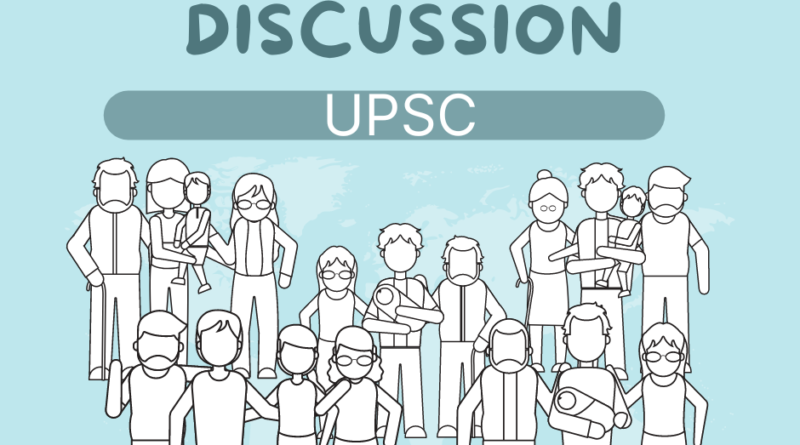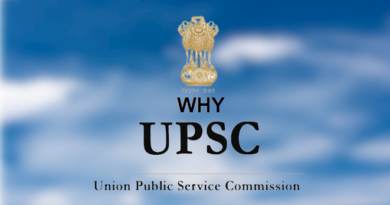GROUP DISCUSSION AND UPSC
Group discussion is an effective way to prepare for UPSC exams. UPSC is a highly competitive exam in India that requires candidates to have extensive knowledge, critical thinking skills, and excellent communication skills. Group discussions can help candidates develop all these skills and more, making it an ideal tool for UPSC preparation.
In this article, I will discuss the effectiveness of group discussions for UPSC preparation, including the benefits, drawbacks, and strategies for effective group discussions.
Benefits of Group Discussions for UPSC Preparation
Sharing and Exchange of Ideas:
One of the most significant benefits of group discussions is that they facilitate the sharing and exchange of ideas among participants. Every participant brings their perspective, experiences, and ideas to the table, which creates a diverse pool of knowledge and information. This exchange of ideas can be particularly beneficial for UPSC preparation, as the exam requires candidates to have a comprehensive understanding of a wide range of topics.
Improved Critical Thinking Skills: Group discussions also promote critical thinking skills. We encourage participants to question each other’s ideas, analyze arguments, and evaluate evidence. This helps students to develop a more nuanced and critical understanding of the topics being discussed. Since UPSC exams require candidates to have a deep understanding of complex issues, the development of critical thinking skills is crucial.
Development of Communication Skills: Effective communication is a vital aspect of UPSC preparation. Group discussions provide candidates with opportunities to develop their communication skills by expressing their ideas clearly, listening actively, and responding thoughtfully to others’ ideas. Moreover, group discussions also help participants develop their public speaking skills, which can be particularly beneficial for the interview round of the UPSC exam.
Exposure to Different Perspectives: Group discussions expose participants to different perspectives, which can broaden their understanding of complex issues. Participants can learn from each other’s experiences, opinions, and knowledge, leading to a more comprehensive understanding of the topics being discussed. This exposure to different perspectives can also help candidates develop empathy and tolerance, essential qualities for an aspiring civil servant.
Teamwork and Collaboration: Group discussions require teamwork and collaboration, which are crucial skills for a civil servant. Participants learn to work together towards a common goal, listen to each other, and respect each other’s opinions. These skills can be particularly useful for the group discussion round of the UPSC exam.
Drawbacks of Group Discussions for UPSC Preparation
Dominant Participants: In a group discussion, some participants may dominate the conversation, leading to an uneven distribution of participation. This can make it difficult for quieter participants to contribute effectively. Dominant participants may also influence the group’s direction, which can be problematic if their ideas are not well-reasoned or supported by evidence.
Time Constraints: Group discussions can be time-consuming, which can be a challenge for UPSC aspirants who have limited time for preparation. Participants may need to find a balance between participating in group discussions and focusing on individual study.
Lack of Expertise: Group discussions may not always include experts on the topics being discussed. This can lead to misinformation or incomplete understanding of the topics being discussed. To overcome this, participants must ensure that they have access to reliable sources of information and verify facts before accepting them as true.
Lack of Accountability: In a group discussion, participants may not feel accountable for their contributions, which can lead to a lack of preparation or engagement. This can be problematic for UPSC aspirants who need to be self-motivated and disciplined in their preparation.
Strategies for Effective Group Discussions for UPSC Preparation
Effective group discussions can be an excellent way to prepare for UPSC exams as they allow participants to share knowledge, perspectives, and insights on various topics. Here are some strategies for conducting successful group discussions for UPSC preparation:
Define the objective: Start by defining the objective of the discussion. It could be to brainstorm ideas, clarify concepts, or discuss different perspectives on a particular topic.
Choose the right topic: Select a topic that is relevant to UPSC exam preparation and interests all members of the group. It is also essential to ensure that the topic is broad enough to allow for a range of perspectives.
Establish ground rules: Set some ground rules at the beginning of the discussion to ensure that everyone gets a chance to speak and that the conversation remains respectful and constructive. Some rules might include speaking in turn, listening attentively, avoiding interrupting others, and avoiding personal attacks.
Prepare beforehand: Encourage all participants to prepare for the discussion in advance. This could include reading relevant books, articles, or current affairs updates.
Encourage participation: Encourage all members of the group to participate actively in the discussion. Some individuals may be shy or hesitant to speak up, so it is important to create a safe and welcoming environment where everyone feels comfortable expressing their opinions.
Moderate the discussion: The moderator should ensure that the discussion stays on topic and that all participants get an opportunity to speak. They can also summarize the main points of the discussion and identify any areas where further research or discussion is necessary.
Be open-minded: Participants should approach the discussion with an open mind and be willing to consider different perspectives. They should be respectful of others’ opinions and avoid dismissing them outright.
Take notes: Assign someone to take notes during the discussion to summarize the key points and any action items that arise. These notes can be useful for future reference and can help keep the group focused on its objectives.
By following these strategies, group discussions can be an effective way to prepare for UPSC exams and broaden your knowledge on various topics.
समूह चर्चा UPSC की तैयारी
समूह चर्चा UPSC की तैयारी के लिए बहुत प्रभावी हो सकती है। UPSC (संघ लोक सेवा आयोग) भारत में एक उच्च प्रतिस्पर्धात्मक परीक्षा है जो उम्मीदवारों को विस्तृत ज्ञान, महत्वपूर्ण विचार विमर्श कौशल और उत्कृष्ट संचार कौशल की आवश्यकता होती है। समूह चर्चा उन सभी कौशलों को विकसित कर सकती है, जो उम्मीदवारों को UPSC की तैयारी के लिए आवश्यक होते हैं।
इस निबंध में, मैं UPSC की तैयारी के लिए समूह चर्चाओं के प्रभावकारिता को विस्तार से चर्चा करूंगा, जिसमें लाभ, हानियां और उचित समूह चर्चा करने के तरीके शामिल होंगे।
समूह चर्चा UPSC तैयारी के लिए लाभ
- विचारों की साझा करना और विनिमय: समूह चर्चाओं का सबसे बड़ा लाभ यह है कि वे प्रतिभागियों के बीच विचारों को साझा करने और विनिमय करने को सुविधाजनक बनाते हैं। हर प्रतिभागी अपना दृष्टिकोण, अनुभव और विचारों को लेकर आता है, जो ज्ञान और जानकारी का एक विस्तार करते हैं
- जानकारी का विस्तार: समूह चर्चाओं में प्रतिभागी अपनी जानकारी को विस्तार से बढ़ाते हैं। अलग-अलग प्रतिभागियों के अलग-अलग विषयों की जानकारी एक स्थान पर आकर सभी को एक साथ ज्ञान की भंडार का लाभ होता है।
- उत्कृष्ट संचार कौशल: समूह चर्चाओं में बातचीत के दौरान प्रतिभागी उत्कृष्ट संचार कौशल विकसित करते हैं। ये कौशल उनके लिए अत्यंत महत्वपूर्ण होते हैं, क्योंकि UPSC में संचार कौशल साक्षात्कार में मदद करता है I
- सहयोग और समन्वय: समूह चर्चाओं में प्रतिभागी सहयोग और समन्वय का अनुभव प्राप्त करते हैं। ये कौशल UPSC के लिए अत्यंत महत्वपूर्ण हैं, क्योंकि UPSC की तैयारी में सहयोग्यता के साथ समन्वय करना अत्यंत आवश्यक होता है।
- महत्वपूर्ण जानकारी का समीक्षण: समूह चर्चाओं में प्रतिभागी अपने विचारों और ज्ञान का विस्तार करते हैं, जो UPSC की तैयारी के लिए उत्तम है। समूह चर्चाओं में विभिन्न विषयों पर चर्चा करने से अधिक संभव है कि प्रतिभागी नई जानकारी का सामना करें और इसे समीक्षा करें।
- अधिक समझदारी: समूह चर्चाओं में प्रतिभागी अधिक समझदार होते हैं क्योंकि वे अलग-अलग विषयों पर अपने विचारों को व्यक्त करने के माध्यम से अपनी समझ को विस्तार से बढ़ाते हैं।
- संवाद कौशल: समूह चर्चाओं में प्रतिभागी संवाद कौशल का अभ्यास करते हैं। ये कौशल UPSC में बहुत महत्वपूर्ण होते हैं, क्योंकि UPSC की परीक्षा में प्रश्नों के जवाब देने के लिए अच्छे संवाद कौशल की जरूरत होती है।
- अनुभव का आदान-प्रदान: समूह चर्चाओं में प्रतिभागी अपने अनुभवों को आदान-प्रदान करते हैं, जो UPSC की तैयारी केलिए बहुत महत्वपूर्ण होते हैं। उन्हें अन्य लोगों के अनुभव से सीखने का मौका मिलता है और उन्हें अपने अनुभवों को भी साझा करने का मौका मिलता है।
- सहयोग: समूह चर्चाओं में सहयोग का महत्वपूर्ण भूमिका होती है। उनमें सहयोग बढ़ता है जब सभी प्रतिभागी एक दूसरे की मदद करते हुए एक ही लक्ष्य की ओर जाते हैं।
- जीवन कौशल विकसित करना: समूह चर्चाओं में प्रतिभागी जीवन कौशल जैसे समय प्रबंधन, टीमवर्क, संवाद कौशल और सहयोग कौशल का विकास करते हैं। ये सभी कौशल UPSC की तैयारी के लिए बहुत महत्वपूर्ण होते हैं।
इन सभी कारणों से समूह चर्चाएं UPSC की तैयारी के लिए अत्यंत महत्वपूर्ण होती हैं। उन्हें सोचने और विचारों का विस्तार करने का मौका मिलता है और सभी प्रतिभागी एक दूसरे से सीधे अपने ज्ञान और अनुभवों का आदान-प्रदान कर सकते हैं। उनमें संवाद कौशल और सहयोग कौशल भी विकसित होते हैं, जो UPSC में बहुत महत्वपूर्ण होते हैं। समूह चर्चाएं जीवन कौशलों को भी विकसित करती हैं जो UPSC की परीक्षा के लिए बहुत जरूरी होते हैं।
समूह चर्चाओं का उपयोग UPSC की तैयारी के अलावा अन्य कार्यक्षेत्रों में भी किया जा सकता है। समूह चर्चाएं आपको स्पष्ट दिशा-निर्देश, मूल्यों और लक्ष्यों की जानकारी देती हैं। इससे आपके जीवन में एक बेहतरीन टीमवर्क दृष्टिकोण विकसित होता है और आप सही निर्णय लेने में सक्षम होते हैं।
अंत में, समूह चर्चाएं UPSC की तैयारी में एक महत्वपूर्ण एवं प्रभावी उपकरण होती हैं। समूह चर्चाओं से आप संवाद कौशल, सहयोग कौशल और जीवन कौशल विकसित कर सकते हैं जो UPSC की परीक्षा के अलावा आपके जीवन में भी उपयोगी होते हैं। इसलिए, आपको अपनी UPSC की तैयारी के लिए समूह चर्चाओं में शामिल होना चाहिए।
यूपीएससी की तैयारी के लिए समूह चर्चाओं की कमियों
प्रभावशाली प्रतिभागियों: समूह चर्चा में, कुछ प्रतिभागियों वार्तालाप पर अधिकार जमा सकते हैं, जिससे भागीदारी का अनुवंशीय वितरण हो सकता है। यह चुपचाप भाग लेने वाले प्रतिभागियों के लिए प्रभावी योगदान देना मुश्किल बना सकता है। प्रभावशाली प्रतिभागियों का समूह के दिशा-निर्देश को प्रभावित करने का भी खतरा होता है, जो उनके विचारों के यथार्थ या समर्थन के बिना मुश्किल हो सकता है।
समय सीमाएं: समूह चर्चा समय लेने वाली होती है, जो यूपीएससी उम्मीदवारों के लिए जो अल्प समय तक प्रियोजन में व्यतिगत अध्ययन करने की सीमा होती है, एक चुनौती हो सकती है। भागियों को समूह चर्चा में भाग लेने और व्यक्तिगत अध्ययन पर ध्यान केंद्रित करने के बीच एक संतुलन ढूंढने की जरूरत हो सकती है।
अभिज्ञता की कमी: समूह चर्चा हमेशा उन विषयों के विशेषज्ञों को शामिल नहीं करती है। इससे अपूर्ण जानकारी या अधूरी समझ की समस्या हो सकती है। इस समस्या को दूर करने के लिए, भागीदारों को सुनिश्चित करना होगा कि वे विश्वसनीय स्रोतों का उपयोग करते हुए जानकारी का पुष्टिकरण करें।
ज़िम्मेदारी की कमी: समूह चर्चा में, भागीदारों को अपने योगदान के लिए ज़िम्मेदार महसूस करने में मुश्किल हो सकती है, जो तैयारी में आत्म-प्रेरित और अनुशासित होने की आवश्यकता होती है। यह यूपीएससी उम्मीदवारों के लिए असुविधाजनक हो सकता है।
इन सभी कमियों के बावजूद, समूह चर्चा एक उपयोगी उपकरण हो सकती है जो यूपीएससी की तैयारी में मदद करता है। भागीदारों को अपनी तैयारी के लक्ष्य के आधार पर अपनी समय सारणी के लिए चुनौतियों का सामना करना होगा, सत्यापित जानकारी का उपयोग करते हुए संवेदनशील योगदान देना होगा और स्वयं को संयमित और प्रेरित बनाने के लिए खुद को मजबूत बनाना होगा।
सफल समूह चर्चाएं उनके लिए उपयोगी हो सकती हैं, जो UPSC परीक्षा की तैयारी कर रहे हैं, क्योंकि इनसे शामिल होने वाले सदस्य विभिन्न विषयों पर अपनी ज्ञान, दृष्टिकोण और विचारों को साझा कर सकते हैं। यहाँ कुछ रणनीतियाँ सफल समूह चर्चाओं के लिए बताई गई हैं:
- उद्देश्य की परिभाषा करें: चर्चा के उद्देश्य की परिभाषा करने से शुरुआत करें। यह विचारों का उत्पादन, अवधारणाओं को स्पष्ट करना या किसी विशेष विषय पर विभिन्न दृष्टिकोणों की चर्चा करना हो सकता है।
- सही विषय चुनें: समूह के सभी सदस्यों को रुचि रखने वाले एक विषय चुनें जो UPSC परीक्षा की तैयारी से संबंधित हो। इसके अलावा, यह महत्वपूर्ण है कि विषय विस्तारशील हो जिससे विभिन्न दृष्टिकोणों की अनुमति हो।
- नियम तय करें: चर्चा की शुरुआत में कुछ नियम तय करें ताकि सभी को बारी-बारी से बोलने का मौका मिले और बातचीत संभवतः सहज व विनम्र हो। कुछ नियमों में शामिल हो सकते हैं बातचीत का विषय निर्धारित करना, सभी की बात सुनना, किसी भी व्यक्ति को बीच में नहीं बोलने देना, और अन्यों की अभिव्यक्ति का सम्मान करना।
- पहले से तैयारी करें: सभी सदस्यों को चर्चा के लिए पहले से तैयार होने के लिए प्रोत्साहित करें। इसमें उपयुक्त पुस्तकें, लेख या समयसारिता का अध्ययन शामिल हो सकता है।
- सहभागिता को प्रोत्साहित करें: समूह के सभी सदस्यों को चर्चा में सक्रिय रूप से सहभागी होने के लिए प्रोत्साहित करें। कुछ लोग शर्मिले या हिचकिचाते हो सकते हैं, इसलिए सुरक्षित और स्वागतपूर्ण वातावरण बनाना महत्वपूर्ण है जहां सभी अपने विचारों को व्यक्त करने के लिए आसान महसूस करते हों।
- चर्चा का नियंत्रण करें: मॉडरेटर को सुनिश्चित करना चाहिए कि चर्चा विषय के अनुसार रहती है और सभी सदस्यों को बोलने का एक मौका मिलता है। वे मुख्य बिंदुओं का सारांश दे सकते हैं और उस क्षेत्र में अतिरिक्त गहनता का ध्यान देने की जरूरत नहीं होती है। सहभागिता को संतुलित रखना एक अन्य महत्वपूर्ण मुद्दा है।
- समूह में सहयोग का विकास करें: सभी सदस्यों को संवाद को सहयोगी बनाने के लिए प्रोत्साहित करें। सहयोगी संवाद का मतलब है कि समूह के सदस्य संभवतः सहमत नहीं होंगे लेकिन वे अपने विचारों को आदान-प्रदान करते हुए आपस में सहयोग कर सकते हैं।
- निष्कर्ष निकालें: सभी सदस्यों को विचारों को समझाने के लिए प्रोत्साहित करें। निष्कर्ष संग्रह उन सभी विचारों का सारांश होता है जो चर्चा के दौरान उत्पन्न हुए होंगे। निष्कर्ष बातचीत के नतीजे का सार होता है, जो समूह के लिए उपयोगी होता है।
इन रणनीतियों का पालन करने से आप अपने UPSC की तैयारी के लिए समूह चर्चाओं को अधिक सफल बनाने में सक्षम होंगे।




